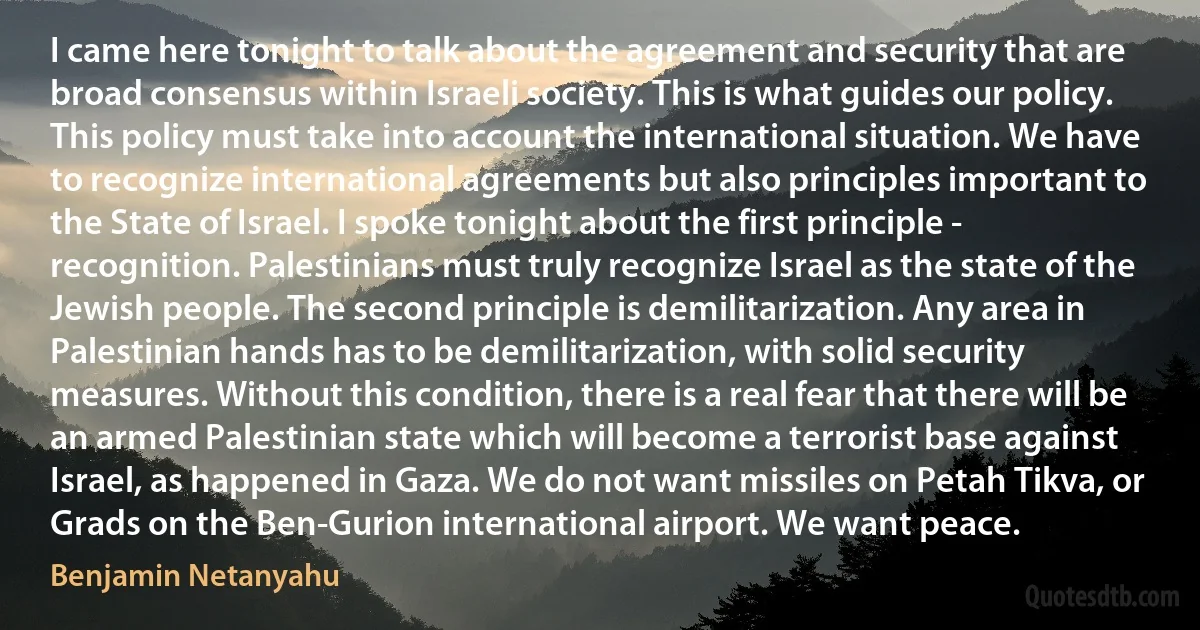
I came here tonight to talk about the agreement and security that are broad consensus within Israeli society. This is what guides our policy. This policy must take into account the international situation. We have to recognize international agreements but also principles important to the State of Israel. I spoke tonight about the first principle - recognition. Palestinians must truly recognize Israel as the state of the Jewish people. The second principle is demilitarization. Any area in Palestinian hands has to be demilitarization, with solid security measures. Without this condition, there is a real fear that there will be an armed Palestinian state which will become a terrorist base against Israel, as happened in Gaza. We do not want missiles on Petah Tikva, or Grads on the Ben-Gurion international airport. We want peace.
Benjamin NetanyahuRelated topics
account agreement base came condition consensus fear international palestinian peace people real second security situation spoke state take talk terrorist airport israeli hands gazaRelated quotes
Some of the great results of the war, if they are adequately realized, are in complete harmony with what for ages past have been Liberal aims and ideals. I mean, for instance, the abolition of militarism; I mean the progressive disarmament of the civilized peoples of the world; I mean the recognition for small states as well as for great States of the principle of self-determination. ... And it means, above all, or ought to mean...a conversion of the old State system with its precarious equipoise of power, with its shifting alliances and combinations, with its infinite opportunities for the achievements of selfish ambition and territorial aggrandizement, it means the conversion of that into a true international democratic polity, a system of Government under which there will be equal rights and equal power to all States whatever their size.

H. H. Asquith
In our opinion, certain changes must be made in the conduct of international affairs, systematically subordinating all concrete aims and local tasks to the basic task of actively preventing an aggravation of the international situation, of actively pursuing and expanding peaceful coexistence to the level of cooperation, of making policy in such a way that its immediate and long-range effects will in no way sharpen international tensions and will not create difficulties for either side that would strengthen the forces of reaction, militarism, nationalism, fascism, and revanchlsm.
International affairs must be completely permeated with scientific methodology and a democratic spirit, with a fearless weighing of all facts, views, and theories, with maximum publicity of ultimate and intermediate goals, and with a consistency of principles.

Andrei Sakharov
Whenever Israel faces a public relations debacle such as the Intifada or international pressure to resolve the Israel-Palestine conflict, American Jewish organizations orchestrate this extravaganza called the 'new anti-Semitism.' The purpose is several-fold. First, it is to discredit any charges by claiming the person is an anti-Semite. It's to turn Jews into the victims, so that the victims are not the Palestinians any longer. As people like Abraham Foxman of the ADL put it, the Jews are being threatened by a new holocaust. It's a role reversal – the Jews are now the victims, not the Palestinians. So it serves the function of discrediting the people leveling the charge. It's no longer Israel that needs to leave the Occupied Territories; it's the Arabs who need to free themselves of the anti-Semitism.

Norman Finkelstein
Justice is the end of government. It is the end of civil society. It ever has been, and ever will be, pursued, until it be obtained, or until liberty be lost in the pursuit. In a society, under the forms of which the stronger faction can readily unite and oppress the weaker, anarchy may as truly be said to reign, as in a state of nature where the weaker individual is not secured against the violence of the stronger: And as in the latter state even the stronger individuals are prompted by the uncertainty of their condition, to submit to a government which may protect the weak, as well as themselves: so in the former state, will the more powerful factions be gradually induced by a like motive, to wish for a government which will protect all parties, the weaker as well as the more powerful.

Alexander Hamilton
For what advantage is it, that the world enjoys profound peace, if thou art at war with thyself? This then is the peace we should keep. If we have it, nothing from without will be able to harm us. And to this end the public peace contributes no little: whence it is said, ‘That we may lead a quiet and peaceable life.' But if any one is disturbed when there is quiet, he is a miserable creature. Seest thou that He speaks of this peace which I call the third (inner, ed.) kind? Therefore when he has said, ‘that we may lead a quiet and peaceable life,' he does not stop there, but adds ‘in all godliness and honesty.' But we cannot live in godliness and honesty, unless that peace be established. For when curious reasonings disturb our faith, what peace is there? or when spirits of uncleanness, what peace is there?

John Chrysostom
